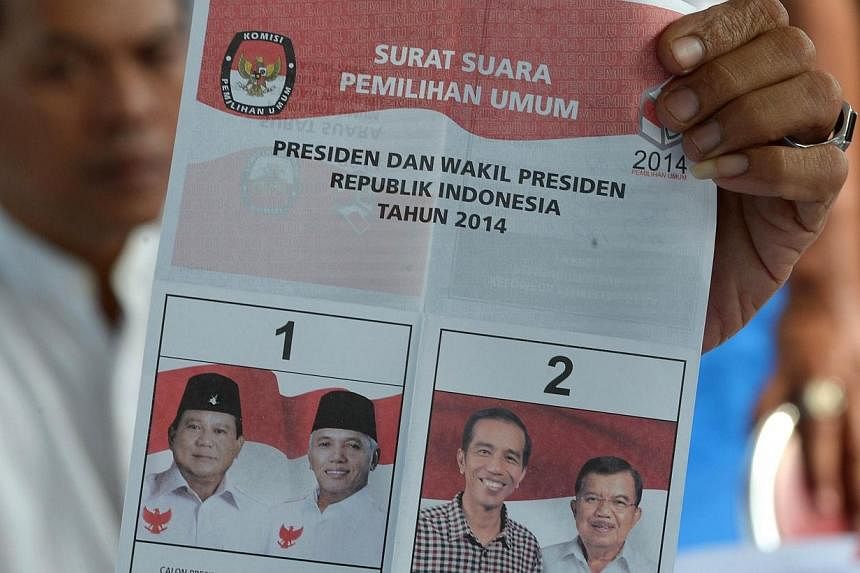With both presidential candidates claiming victory in a hard-fought race, uncertainty and fears over possible violence by impatient supporters threaten to mar an otherwise peaceful election, as the government appealed to both sides to hold off celebrations till the official result that will be finalised only about two weeks later.
It is also possible that the official result itself - to be announced on July 21 or 22 - might still not end the matter, as the loser could bring his complaint to the Constitutional Court that he was unfairly robbed of victory. The court could take till end-August to make a decision, according to political analysts.
The unofficial result using the 'quick count' method by several organisations - which have been used accurately to predict past legislative and presidential elections - showed that Jakarta governor Joko Widodo and his running mate Jusuf Kalla, a former vice president, had won by a narrow margin, of between 4 and 5 percentage points.
Mr Joko declared victory.
But this was followed an hour later by a victory declaration by his rival Prabowo Subianto and his team. Mr Prabowo' running mate is former minister Hatta Rajasa.
Mr Yang Razali Kassim, Senior Fellow with the S. Rajaratnam School of International Studies, told The Straits Times: "Should the narrow margin be confirmed and both sides insist on victory based on their respective quick counts, it is highly likely that the results be challenged and taken to the Constitutional Court."
"More worrisome is that dissatisfaction with the results could lead to political tension."
Pollsters Saiful Mujani showed that Mr Joko led by 52.95 per cent to Mr Prabowo's 47.05 per cent, with 99.6 per cent of quick count votes tallied.
The Kompas newspaper result showed Mr Joko won 52.34 per cent of the votes to 47.66 by Mr Prabowo, with 100 per cent of the results tallied.
Other organisations all showed that Mr Joko had won also, using the same method.
But Mr Prabowo's camp said their own quick count survey showed they had won.
The quick count is based on a sample of results from some 2,000 polling stations around the contry and have proven accurate in previous elections, by up to 0.5 percentage point.
Mr Prabowo in his Facebook account wrote: "On the differing claims over the quick count results, we ask our brothers, supporters of our Red White Coalition and all the people of Indonesia to protect and safeguard this victory.
"Guard the vote count at each polling station, every village, every sub-district, every regency, every province, till the final and official count by the election commission on July 22.
"Once again, I am grateful and feel honoured and moved to be given such a great trust by the people of Indonesia to lead for the next five years."
The declaration of victory by Mr Prabowo raised heckles in the Jokowi camp.
A spokesman for Mr Jokowi, Mr Anies Baswedan, called on Mr Prabowo and Mr Hatta to behave like "statesmen".
"For me, all credible survey institutes declared our victory at a minimum of five per cent," he was quoted by Reuters as saying.
The actual results, resulting from counting the ballots cast by some 190 million registered voters living in more than 7,000 inhabited islands spanning three time zones, will take time. Officials will need to then tally the collected data into computers.
The two-week long waiting period has put the country into a big uncertainty, with concerns that supporters might take to the streets to voice their unhappiness.
The rupiah currency and the stockmarket are likely to fall due to the prolonged uncertainty, analaysts say,
President Susilo Bambang Yudhoyono in a tweet asked both camps not to ask their supporters to go to the streets.
Said Dr Alexander R. Arifianto, Visiting Fellow at Singapore's Institute of Southeast Asian Studies: "This has the potential to escalate especially if the Prabowo camp decide to do extra-constitutional measures."
He was referring to concerns also expressed by other analysts that impatient supporters of Mr Prabowo might decide to protest on the streets and raising tensions in the country.

